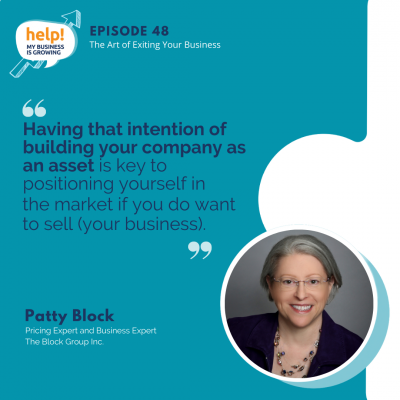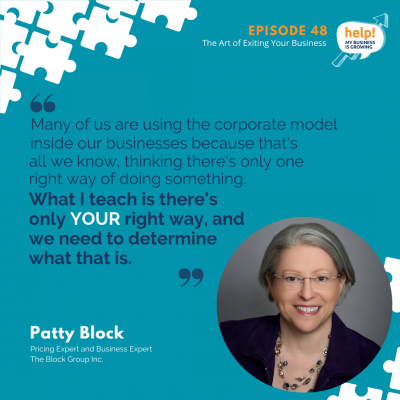The Art of Exiting Your Business
— Help! My Business is Growing!

The Art of Exiting Your Business
Exiting a business may not be top of mind when you're busy running and growing it. Still, it's a critical part of owning a business and being a successful entrepreneur.
Developing a comprehensive exit strategy ensures a smooth transition and maximizes the value of your hard work.
And whether you're retiring, selling your business, or moving on to a new venture, the success of your exit depends on early planning and careful execution.
But coming up with an exit plan can be challenging; it can get complicated, with many moving parts, and also emotionally overwhelming.
So what are the key steps in creating a successful exit plan?
In the latest episode of Help! My Business is Growing! our guest Patty Block discusses how to develop an exit plan and how to start the process.
A business advisor and pricing expert, Patty believes that consistent business success comes from leveraging your hidden advantage, making informed decisions, communicating powerfully, and taking calculated action.
Since 2006, Patty has empowered women business owners who are experts in their fields to turn up their power to price, sell, and run their businesses on their own terms.
She is also an author and in her book, Your Hidden Advantage: Unlock the Power to Attract Right-fit Clients and Boost Your Revenue, Patty reveals a new perspective and proven, practical solutions, guiding women to unleash their inner power to run their businesses with less stress and more joy, achieving a more profitable future.
Patty considers herself a native Texan, even though she wasn’t born there. She got to Texas as fast as she could (at age four) and is based in Houston. Patty raised three wonderful humans who all caught the entrepreneurial bug and have their own successful businesses.
In this week's episode, we discuss:
- 02:33 What are some different ways you can exit the business?
- 04:26 What's the difference between exiting and selling a business?
- 08:48 The importance of building assets and intellectual property.
- 38:13 How do you catch yourself overdelivering?
- 42:09 What's the one actionable step that someone thinking about exiting their company in the future can do in the next month to get them closer to that goal?
Listen to the episode here:
"There are several different ways you can exit the business. The underpinning of all of that is- what do you want? What do you want to accomplish? What do you want your life to look like once you've sold or once you've exited that business?"
What are some different ways you can exit the business?
There are various ways to exit a business, depending on your goal.
For instance, some business owners are motivated by getting value from their business for everything they have built. This could mean selling their business to fund their retirement plan, which is a common strategy, while other founders may want to pass their business down to a family member or key employee.
Note: Not everyone may be interested in selling their business, but they want to exit their company and pursue something different, like starting a new hobby-based business or exploring new opportunities.
Overall, there are several ways to structure an exit strategy, and it all starts with understanding what you want and what you want your life to look like after you have exited your business. This could involve passing down your business, selling it, or morphing it into something new and different.

What's the difference between exiting and selling a business?
Exiting a business refers to the process of leaving or disengaging from the business, which can include:
- Selling the business
- Passing it on to a family member or successor
- Merging with another business
- Closing the business.
It can involve a range of internal operational strategies, including rebranding, changing services, or bringing in new team members.
On the other hand, selling a business is one of several options available when exiting a business. However, it requires careful consideration of your goal, the buyer's expectations, and your company's revenues, assets, intellectual property, and even its systems and processes.
Ultimately, the decision to exit a business and the strategy chosen will depend on the unique circumstances and goals of the business owner.
"Bringing in more revenue does not necessarily mean your (business is) profitable. When you're looking for a buyer, they're looking for consistency, predictability, and consistent revenue. They may or may not want your processes, but they’ll always want to know that there is recurring revenue."
Besides hiring, what else should you think about as you're trying to build assets in your business?
Building intellectual property assets in your business requires clarity on what you want for your business and your life, especially if you plan on moving away from a leadership role. Hiring higher-level staff may be necessary, but it can also be costly.
It's important to consciously build and grow these assets which can include:
- Logos and registered trademarks
- Operations manual
- Content: on social media, your web pages, and more
- Systems and Processes
Having these in place will ensure consistency and confidence in your business, as well as attract the right clients and price for value. This foundational piece is crucial for positioning your company for future exit and selling plans.
How do you catch yourself overdelivering?
Overdelivering can be admirable, but it's important to have a good scope of work that is discussed and written down. If you go above and beyond, you should be compensated for it.
Fear can often hold us back from asking for compensation or addressing these issues with clients, but having a well-crafted scope of work can help.
It's also important not to take things personally and use the structure of your work to guide your conversations with clients.
By shifting your mindset and focusing on priorities, you can address additional work or changes to the scope of work to benefit everyone concerned.
"Having a sales structure and process will change everything in your business because you will function with so much more confidence and help your buyers get ready to buy."
What's the one actionable step that someone thinking about exiting their company in the future can do in the next month to get them closer to that goal?
The one, actionable step someone can take in the next month to start exiting their company is to conduct an audit of their business processes and intellectual property, identifying what assets they have and what else needs to be developed.
Starting small with documenting one process and turning it into a checklist using readily available templates can be effective. You can then consider whether someone would value all these assets when buying the company.
We go in-depth with this topic and more over at the podcast. Listen here:
To Recap:
1. Depending on your goals and motivations, there are various ways to exit a business. Some may want to sell or maybe pass it down to family or employees. Focus on what you want your life to look like after exiting the business.
2. Exiting a business can involve selling it, passing it on to a family member, merging with another business, or closing it. Selling a business is a specific type of exit strategy. The decision to exit a business and the strategy chosen depends on the unique circumstances and goals of the business owner.
3. To build intellectual property assets, be clear on your goals and hire people if necessary. Building assets will ensure consistency, and confidence and attract the right clients. This is crucial for future plans to exit or sell the business.
4. Avoid overdelivering on work, especially when you are not compensated for it. Have a well-crafted written scope that you can refer back to manage expectations better.
5. Conduct an audit and review of all business processes and intellectual property.
Identify gaps in processes and begin documenting them, starting with one process at a time, and start building them.
About Patty Block
Pricing Expert and Business Expert
The Block Group Inc.
Business advisor and pricing expert Patty Block believes that consistent business success comes from leveraging your hidden advantage, making informed decisions, communicating powerfully, and taking calculated action. Since 2006, Patty has empowered women business owners who are experts in their fields to turn up their power to price, sell, and run their businesses on their own terms.
In her book, Hidden AdvantageTM: Unlock the Power to Attract Right-fit Clients and Boost Your Revenue, Patty reveals a new perspective and proven, practical solutions, guiding women to unleash their inner power to run their businesses with less stress and more joy, achieving a more profitable future.
Patty considers herself a native Texan, even though she wasn’t born there. She got to Texas as fast as she could (at age four) and is based in Houston. Patty raised three wonderful humans who all caught the entrepreneurial bug and have their own successful businesses.





